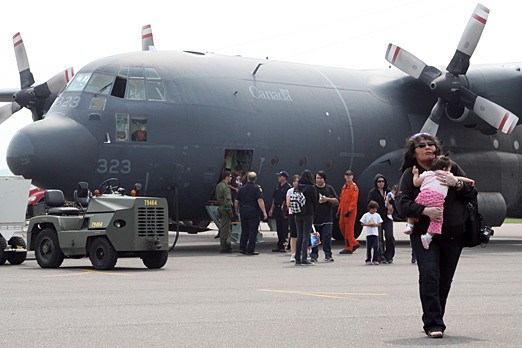Thunder Bay officials are asking regional communities for help as the city has been made a transportation hub for Far North residents fleeing forest fires.
Up to 1,000 people are expected to arrive on Tuesday and 7,000 could move through the city throughout the week. As a transportation hub, the evacuees will arrive in Thunder Bay, register with the Red Cross and then wait to be transported to other municipalities.
About 280 Sandy Lake residents arrived in Monday evening and are staying out the evacuation at the Victoria Inn. Around 120 more were expected late Tuesday morning with some staying in Thunder Bay and others headed to Wawa.
“We just don’t have the facility and the capacity to deal with that many people for that length of time,” said Thunder Bay Fire and Rescue Chief John Hay. “We would end up with a tent city or cots in arenas and we’re trying to get other communities to also give us a hand and step up.”
Evacuees will be registering at the Confederation College hangar and then heading to the Fort William Gardens until transportation is ready to take them to a host community.
Hay said they expect the evacuation to last for the week and are hoping they can get people moving through the city as quickly as possible.
“Getting people in and out of the Far North is going to be paramount,” he said.
Mayor Keith Hobbs said it’s an important time for Thunder Bay and they will be drawing on experience from police officers and firefighters to move evacuees through the city.
“I think we are in good hands,” he said.
The province also needs to step up to the plate, Hobbs added, noting they need planes to transport people to other communities.
But the biggest challenge might be the strain on resources.
“Most of us have been up for 24 hours now,” he said. “That’s always the way with a major incident. It’s very labour intensive.”
Nishnawbe-Aski Nation Grand Chief Stan Beardy is also calling for aid from the province and the federal government.
“I am calling on the government of Canada to mobilize all available resources, including the Armed Forces, to ensure that enough aircraft are available to evacuate First Nations at a moment’s notice,” he said in a press release issued Tuesday afternoon.
“I am also asking the province of Ontario to declare a state of emergency so that all necessary resources can be directed to protect the health and safety of the residents of these communities.”
With so many remote communities reliant on air transportation, Beardy said there is a danger heavy smoke from the fires could prevent aircraft from landing. If that were to happen, it would be impossible to get people out safely if an evacuation is issued.
Hundreds of residents from Keewaywin, Cat Lake, North Spirit Lake, Sandy Lake and Kingfisher Lake First Nations have been evacuated to date.
Sign in or register
- Messages
- Post a Listing
- Your Listings
- Your Profile
- Your Subscriptions
- Your Likes
- Your Business
- Support Local News
- Payment History
Registered Users
Already have an account?
New Users
Create a free account.
